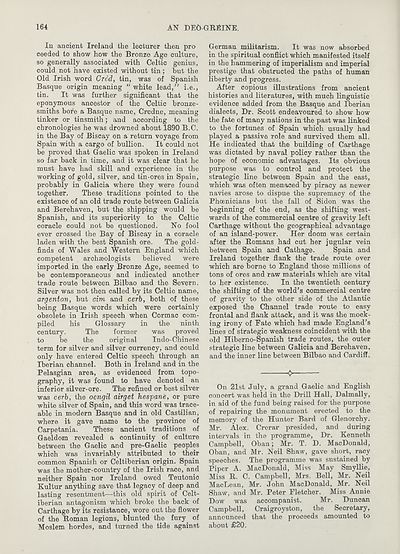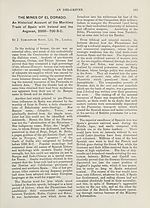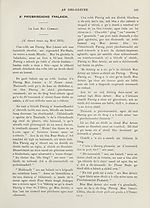An Comunn Gàidhealach Publications > Deo-gréine > Volume 17, October 1921 to September 1922
(172) Page 164
Download files
Complete book:
Individual page:
Thumbnail gallery: Grid view | List view

164
AN DEO-GREINE.
In ancient Ireland the lecturer then pro
ceeded to show how the Bronze Age culture,
so generally associated with Celtic genius,
could not have existed without tin; but the
Old Irish word Cred, tin, was of Spanish
Basque origin meaning “white lead,” i.e.,
tin. It was further significant that the
eponymous ancestor of the Celtic bronze-
smiths bore a Basque name, Credne, meaning
tinker or tinsmith; and according to the
chronologies he was drowned about 1890 B.C.
in the Bay of Biscay on a return voyage from
Spain with a cargo of bullion. It could not
be proved that Gaelic was spoken in Ireland
so far back in time, and it was clear that he
must have had skill and experience in the
working of gold, silver, and tin-ores in Spain,
probably in Galicia where they were found
together. These traditions pointed to the
existence of an old trade route between Galicia
and Berehaven, but the shipping would be
Spanish, and its superiority to the Celtic
coracle could not be questioned. No fool
ever crossed the Bay of Biscay in a coracle
laden with the best Spanish ore. The gold-
finds of Wales and Western England which
competent archaeologists believed were
imported in the early Bronze Age, seemed to
be contemporaneous and indicated another
trade route between Bilbao and the Severn.
Silver was not then called by its Celtic name,
argenton, but cim and cerb, both of these
being Basque words which were certainly
obsolete in Irish speech when Cormac com¬
piled his Glossary in the ninth
century. The former was proved
to be the original Indo-Chinese
term for silver and silver currency, and could
only have entered Celtic speech through an
Iberian channel. Both in Ireland and in the
Pelasgian area, as evidenced from topo¬
graphy, it was found to have denoted an
inferior silver-ore. The refined or best silver
was cerb, the oengil airget hespane, or pure
white silver of Spain, and this word was trace¬
able in modern Basque and in old Castilian,
where it gave name to the province of
Carpetania. These ancient traditions of
Gaeldom revealed a continuity of culture
between the Gaelic and pre-Gaelic peoples
which was invariably attributed to their
common Spanish or Celtiberian origin. Spain
was the mother-country of the Irish race, and
neither Spain nor Ireland owed Teutonic
Kultur anything save that legacy of deep and
lasting resentment—this old spirit of Celt¬
iberian antagonism which broke the back of
Carthage by its resistance, wore out the flower
of the Roman legions, blunted the fury of
Moslem hordes, and turned the tide against
German militarism. It was now absorbed
in the spiritual conflict which manifested itself
in the hammering of imperialism and imperial
prestige that obstructed the paths of human
liberty and progress.
After copious illustrations from ancient
histories and literatures, with much linguistic
evidence added from the Basque and Iberian
dialects, Dr. Scott endeavoured to show how
the fate of many nations in the past was linked
to the fortunes of Spain which usually had
played a passive role and survived them all.
He indicated that the building of Carthage
was dictated by naval policy rather than the
hope of economic advantages. Its obvious
purpose was to control and protect the
strategic line between Spain and the east,
which was often menaced by piracy as newer
navies arose to dispue the supremacy of the
Phoenicians but the fall of Sidon was the
beginning of the end, as the shifting west¬
wards of the commercial centre of gravity left
Carthage without the geographical advantage
of an island-power. Her doom was certain
after the Romans had cut her jugular vein
between Spain and Cathage. Spain and
Ireland together flank the trade route over
which are borne to England those millions of
tons of ores and raw materials which are vital
to her existence. In the twentieth century
the shifting of the world’s commercial centre
of gravity to the other side of the Atlantic
exposed the Channel trade route to easy
frontal and flank attack, and it was the mock¬
ing irony of Fate which had made England’s
lines of strategic weakness coincident with the
old Hiberno-Spanish trade routes, the outer
strategic line between Galicia and Berehaven.
and the inner line between Bilbao and Cardiff.
o
On 21st July, a grand Gaelic and English
concert was held in the Drill Hall, Dalmally,
in aid of the fund being raised for the purpose
of repairing the monument erected to the
memory of the Hunter Bard of Glenorchy.
Mr. Alex. Crerar presided, and during
intervals in the programme, Dr. Kenneth
Campbell, Oban; Mr. T. D. MacDonald,
Oban, and Mr. Neil Shaw, gave short, racy
speeches. The programme was sustained by
Piper A. MacDonald, Miss May Smyllie,
Miss R. C. Campbell, Mrs. Bell, Mr. Neil
MacLean, Mr. John MacDonald, Mr. Neil
Shaw, and Mr. Peter Fletcher. Miss Annie
Dow was accompanist. Mr. Duncan
Campbell, Craigroyston, the Secretary,
announced that the proceeds amounted to
about £20.
AN DEO-GREINE.
In ancient Ireland the lecturer then pro
ceeded to show how the Bronze Age culture,
so generally associated with Celtic genius,
could not have existed without tin; but the
Old Irish word Cred, tin, was of Spanish
Basque origin meaning “white lead,” i.e.,
tin. It was further significant that the
eponymous ancestor of the Celtic bronze-
smiths bore a Basque name, Credne, meaning
tinker or tinsmith; and according to the
chronologies he was drowned about 1890 B.C.
in the Bay of Biscay on a return voyage from
Spain with a cargo of bullion. It could not
be proved that Gaelic was spoken in Ireland
so far back in time, and it was clear that he
must have had skill and experience in the
working of gold, silver, and tin-ores in Spain,
probably in Galicia where they were found
together. These traditions pointed to the
existence of an old trade route between Galicia
and Berehaven, but the shipping would be
Spanish, and its superiority to the Celtic
coracle could not be questioned. No fool
ever crossed the Bay of Biscay in a coracle
laden with the best Spanish ore. The gold-
finds of Wales and Western England which
competent archaeologists believed were
imported in the early Bronze Age, seemed to
be contemporaneous and indicated another
trade route between Bilbao and the Severn.
Silver was not then called by its Celtic name,
argenton, but cim and cerb, both of these
being Basque words which were certainly
obsolete in Irish speech when Cormac com¬
piled his Glossary in the ninth
century. The former was proved
to be the original Indo-Chinese
term for silver and silver currency, and could
only have entered Celtic speech through an
Iberian channel. Both in Ireland and in the
Pelasgian area, as evidenced from topo¬
graphy, it was found to have denoted an
inferior silver-ore. The refined or best silver
was cerb, the oengil airget hespane, or pure
white silver of Spain, and this word was trace¬
able in modern Basque and in old Castilian,
where it gave name to the province of
Carpetania. These ancient traditions of
Gaeldom revealed a continuity of culture
between the Gaelic and pre-Gaelic peoples
which was invariably attributed to their
common Spanish or Celtiberian origin. Spain
was the mother-country of the Irish race, and
neither Spain nor Ireland owed Teutonic
Kultur anything save that legacy of deep and
lasting resentment—this old spirit of Celt¬
iberian antagonism which broke the back of
Carthage by its resistance, wore out the flower
of the Roman legions, blunted the fury of
Moslem hordes, and turned the tide against
German militarism. It was now absorbed
in the spiritual conflict which manifested itself
in the hammering of imperialism and imperial
prestige that obstructed the paths of human
liberty and progress.
After copious illustrations from ancient
histories and literatures, with much linguistic
evidence added from the Basque and Iberian
dialects, Dr. Scott endeavoured to show how
the fate of many nations in the past was linked
to the fortunes of Spain which usually had
played a passive role and survived them all.
He indicated that the building of Carthage
was dictated by naval policy rather than the
hope of economic advantages. Its obvious
purpose was to control and protect the
strategic line between Spain and the east,
which was often menaced by piracy as newer
navies arose to dispue the supremacy of the
Phoenicians but the fall of Sidon was the
beginning of the end, as the shifting west¬
wards of the commercial centre of gravity left
Carthage without the geographical advantage
of an island-power. Her doom was certain
after the Romans had cut her jugular vein
between Spain and Cathage. Spain and
Ireland together flank the trade route over
which are borne to England those millions of
tons of ores and raw materials which are vital
to her existence. In the twentieth century
the shifting of the world’s commercial centre
of gravity to the other side of the Atlantic
exposed the Channel trade route to easy
frontal and flank attack, and it was the mock¬
ing irony of Fate which had made England’s
lines of strategic weakness coincident with the
old Hiberno-Spanish trade routes, the outer
strategic line between Galicia and Berehaven.
and the inner line between Bilbao and Cardiff.
o
On 21st July, a grand Gaelic and English
concert was held in the Drill Hall, Dalmally,
in aid of the fund being raised for the purpose
of repairing the monument erected to the
memory of the Hunter Bard of Glenorchy.
Mr. Alex. Crerar presided, and during
intervals in the programme, Dr. Kenneth
Campbell, Oban; Mr. T. D. MacDonald,
Oban, and Mr. Neil Shaw, gave short, racy
speeches. The programme was sustained by
Piper A. MacDonald, Miss May Smyllie,
Miss R. C. Campbell, Mrs. Bell, Mr. Neil
MacLean, Mr. John MacDonald, Mr. Neil
Shaw, and Mr. Peter Fletcher. Miss Annie
Dow was accompanist. Mr. Duncan
Campbell, Craigroyston, the Secretary,
announced that the proceeds amounted to
about £20.
Set display mode to:
![]() Universal Viewer |
Universal Viewer | ![]() Mirador |
Large image | Transcription
Mirador |
Large image | Transcription
| An Comunn Gàidhealach > An Comunn Gàidhealach Publications > Deo-gréine > Volume 17, October 1921 to September 1922 > (172) Page 164 |
|---|
| Permanent URL | https://digital.nls.uk/127172037 |
|---|
| Description | Leabhar 17, Treasamh Mios an Fhoghair 1921 gu Dara Mìos an Fhoghair 1922 |
|---|---|
| Attribution and copyright: |
|
| Description | This contains items published by An Comunn, which are not specifically Mòd-related. It includes journals, annual reports and corporate documents, policy statements, educational resources and published plays and literature. It is arranged alphabetically by title. |
|---|
| Description | A collection of over 400 items published by An Comunn Gàidhealach, the organisation which promotes Gaelic language and culture and organises the Royal National Mòd. Dating from 1891 up to the present day, the collection includes journals and newspapers, annual reports, educational materials, national Mòd programmes, published Mòd literature and music. |
|---|---|
| Additional NLS resources: |
|

